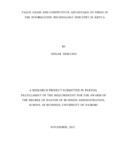| dc.description.abstract | The Information Technology industry in Kenya is highly competitive and in their desire to
remain competitive, the information technology firms need to critically review value adding
processes to eliminate unwanted costs in the industry and consequently stay competitive. The
study sought to establish the relationship between value chain and competitive advantage of
firms in the information technology industry in Kenya. A cross section survey was used in this
study. The target population was the fifteen information technology firms. The study used
census sampling technique while data collection was done using questionnaires. Data was
analyzed using descriptive statistics and inferential statistics (correlation and linear
regression). From the study findings, the study concluded that the information technology
industry has strong competition thus the information technology firms in Kenya adopts
various value chain activities to gain a competitive advantage in the industry. The quality and
lead time were the most significant aspects of competitive strategies adopted by information
technology firms in Kenya. The information technology firms in Kenya were established for
profitability, growth (gain Market share) and survival in market respectively. On practicing of
inbound logistics as a value chain activity, the study concluded that the process system of
receiving inputs is capable of detecting counterfeits and poor quality inputs and that inputs are
well serialized respectively. On practicing operations as a value chain activity the study
concluded that operations conduct checks to ensure all operations conform to required quality
management systems (QMS), operations transform goods into finished products in timely
manner and that operations is able to take corrective actions on faulty goods beforehand
respectively. On out bound logistics as a value chain activity, the research concluded that out
bound logistics has an appropriate and secure system of storing its work in progress goods. On
the practice of marketing and sales as a value chain activity, the research concluded that
marketing and sales as a value chain activity has the capacity to identify the markets demand
and that it attaches importance to having an advertising strategy respectively. From the
correlation analysis the study concluded that there is a correlation between the value chain
activities and the competitive advantage with marketing and sales having the highest value
and infrastructure having the lowest correlation value. From the regression equation, the study
concluded that marketing and sales contribute most to the competitive advantage followed by
out bound logistics. | en |

